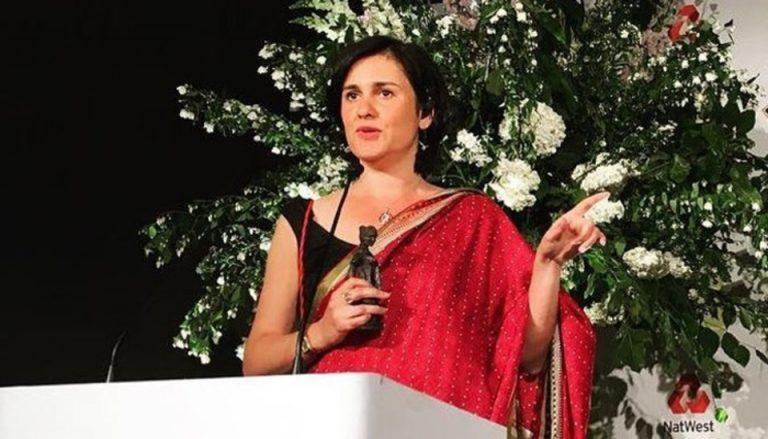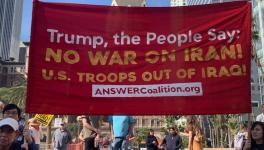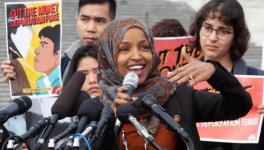Writers Condemn Withdrawal of Nelly Sachs Award Conferred on Kamila Shamsie

Kamila Shamsie, a renowned British-Pakistani author, has earlier been shortlisted for the Booker Prize as well. (Photo: Geo.tv)
Writers, artists and intellectual across the world have condemned the decision of the German city of Dortmund to withdraw the Nelly Sachs award that was conferred on writer Kamila Shamsie. The city administration had cited her support for the Boycott, Divestment and Sanctions (BDS) movement as the reason. The award was conferred on her on September 6.
Expressing the writers’ dismay over the decision, the statement said, “What is the meaning of a literary award that undermines the right to advocate for human rights, the principles of freedom of conscience and expression, and the freedom to criticize? Without these, art and culture become meaningless luxuries.”
The author of several well-known works such as Broken Verses and House on Fire, Shamsie, a Pakistan-born British writer, has been earlier shortlisted for the prestigious Booker Prize.
The Nelly Sachs award, named after a Jewish poet, is conferred every two years. This year’s jury, while justifying its decision to withdraw the award, claimed that they did not know of Shamsie’s support for the BDS movement while finalizing her name.
In response, the writer tweeted that it was “a matter of outrage that the BDS movement (modeled on the South African boycott) that campaigns against the government of Israel for its acts of discrimination and brutality against the Palestinian should be held up as something shameful and unjust.”
The BDS movement, started by the Palestinian Campaign for the Academic Boycott of Israel (PACBI) in 2005, is supported by hundreds of artists, writers and intellectuals from across the world. According to Omar Barghouti, one of the founders of the movement, its main objective is to pressurize Israel “to end its military rule over Palestinian and Syrian territories occupied since 1967, grant equal rights to Palestinian citizens of Israel, and recognize the UN-stipulated right of Palestinian refugees to return to their homes of origin, a universal right that applies to all refugees.”
In order to create such pressure on Israel, a cultural, political and economic boycott has been called for. The movement is inspired by the South African anti-apartheid campaigns and the US civil rights movement.
The Nelly Sachs jury’s revised decision is being attributed to the Israeli state’s influence, which tries to portray BDS as a form of anti-Semitism. Due to Israel’s lobbying, the German parliament, the Bundestag, adopted a non-binding resolution in May, equating BDS with anti-Semitism.
Such allegations have always been denied by the movement. According to Omar Barghouti, “With its inclusive, anti-racist principles, BDS rejects all forms of bigotry, and appeals to progressives everywhere. Its tactics have been adopted by a number of US mainline churches, student governments in tens of universities, academic associations and racial and social justice groups, who wish to avoid being complicit in the suffering of Palestinians.” In fact, the BDS movement is also supported by a large number of intellectuals belonging to the Jewish faith.
The incident with Kamila Shamsie is the latest in a series of such acts in Germany. In June, the Open Source Festival in Dusseldorf cancelled a show by Talib Kweli, a black American rapper, for the same reason. The attempts made by the organizers to persuade him to withdraw his support for the movement were exposed by him in a statement. Kweli had said that he’d “rather be a decent human being and stand up for what’s right” than “lie about BDS for a check”, adding that “To equate a peaceful push for the rights of Palestinian people to the horrors of Nazi Germany is a false and offensive equivalency.”
In another such incident, the director of Berlin’s Jewish Museum was forced to resign in June after a tweet from the museum highlighted an article on a petition signed by more than 240 Jewish intellectuals that appealed to the government to not implement the anti-BDS resolution passed in May. Support for the petition was called “shameful” by the Israeli Ambassador to Germany, which triggered the director’s exit.
Last year, the Ruhrtriennale Festival cancelled a gig by the band, Young Fathers, again due to its support for the BDS. This led to a large debate over the issue in Germany’s literary and artistic circles.
However, such anti-BDS targeting is not limited to Germany alone. Last year, Omar Barghouti was denied permission to travel to the US because of his affiliation with the BDS movement. Recently, as many as 29 US states have passed laws making BDS, or any support for it, illegal. This year, US Democratic Congresswomen Ilhan Omar and Rashida Tlaib were prevented from traveling to Israel for their outspoken support for the BDS movement. Israel had passed a law in 2017, denying visas to all activists affiliated with the movement.
The historical guilt over the holocaust that is widespread in Germany may be the reason for it toeing the Israeli line on BDS. However, there is a growing support for the BDS movement among Germans due to Israel’s explicit acts of violence against Palestinians living in the occupied territories.
The Bundestag’s adoption of the anti-BDS resolution was also criticized for violating international law, as well the freedom of speech, expression, opinion and association granted by the German constitution. According to a joint statement issued by Palestinian civil rights groups, the resolution “forms part of a systematic backlash and organized lobby efforts, primarily led by the Israeli Government, to undermine, delegitimize, and vilify the peaceful BDS movement.”
“In the just concluded Israeli elections, Benjamin Netanyahu announced plans to annex up to one third of the West Bank, in contravention of International law, and his political opponent Benny Gantz’s objection to this was that Netanyahu had stolen his idea; this closely followed the killing of two Palestinian teenagers by Israeli forces- which was condemned as ‘appalling” by the UN Special Coordinator for the Middle East Peace Process. In this political context, the jury of the Nelly Sachs prize has chosen to withdraw the award from me on the basis of my support for a nonviolent campaign to bring pressure on Israeli government. It is a matter of great sadness to me that a jury should bow to pressure and withdraw a prize from a writer who is exercising her freedom of conscience and freedom of expression” Kamila Shamsie said.
Get the latest reports & analysis with people's perspective on Protests, movements & deep analytical videos, discussions of the current affairs in your Telegram app. Subscribe to NewsClick's Telegram channel & get Real-Time updates on stories, as they get published on our website.





















